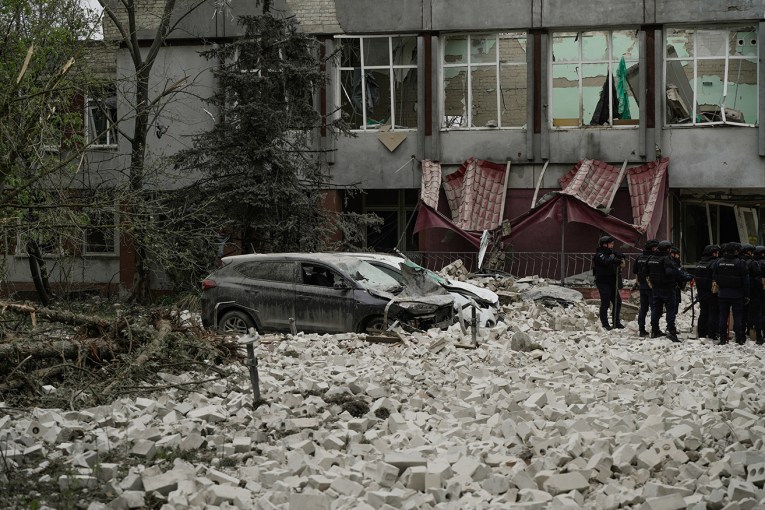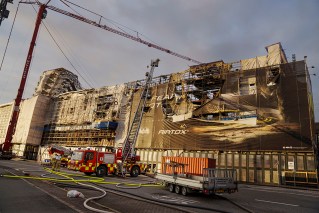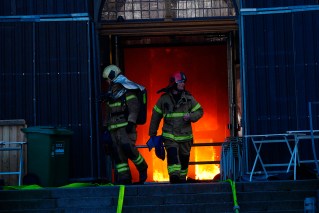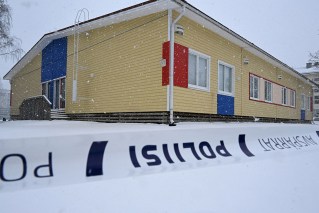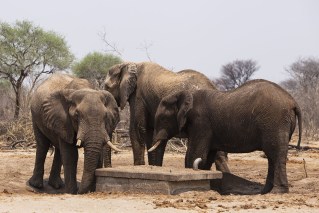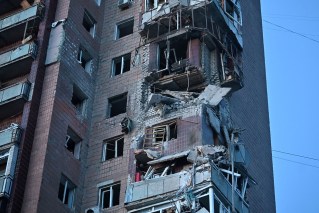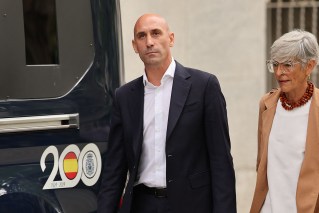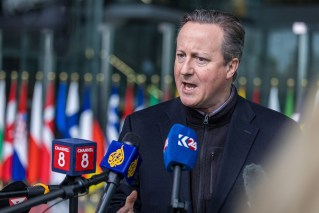Next 24 hours ‘crucial’ for Ukraine, Zelensky warns

President Volodymyr Zelensky says the next 24 hours will be crucial for his country, as fighting continues across Ukraine and neighbour Belarus appears to be readying to join Russia’s invasion.
Mr Zelensky made the comment on a call with British Prime Minister Boris Johnson on Monday (Australian time).
It came just hours after it emerged that Russian ally Belarus had approved a new constitution ditching the country’s non-nuclear status. That would potentially allow the former Soviet republic to become a launchpad for Russian troops invading Ukraine, Russian news agencies said.
Russian news cited the Belarus central elections commission as saying 65.2 per cent of those who took part voted in favour.
The result came as little surprise, given the tightly controlled rule in Belarus of President Alexander Lukashenko.
On Monday afternoon, however, there was a more disturbing development. The Washington Post, citing an unnamed US official, said that Belarus was preparing to send its own soldiers into Ukraine to aid the Russian invasion, a deployment that could begin as soon as Monday.
Shelling resumed in Kyiv and Kharkiv before dawn on Monday (local time), while a residential building was reportedly hit in Chernihiv, in the country’s north.
It came as Belarus’ approval of a new constitution – that could allow nuclear weapons on Belarusian soil for the first time since the country gave them up after the fall of the Soviet Union – raised the states further in the escalating conflict.
Mr Lukashenko backs Russian President Vladimir Putin’s military assault on Ukraine. Late on Sunday, Mr Zelensky said he had agreed to send advisers to the border of Belarus and Ukraine for negotiations with the Russians – although he was blunt about the likelihood of success.
“I will say frankly that I do not really believe in the outcome of this meeting, but let them try to make sure that no citizen of Ukraine has any doubt that I, as a president, did not try to stop the war,” Mr Zelensky wrote on his Telegram channel.
The West has already said it will not recognise the results of the Belarus referendum, which came against the background of a sweeping crackdown on domestic opponents of the government.
On Sunday, speaking at a polling station, Mr Lukashenko said he could ask Russia to return nuclear weapons to Belarus.
“If you (the West) transfer nuclear weapons to Poland or Lithuania, to our borders, then I will turn to Putin to return the nuclear weapons that I gave away without any conditions,” he said.
The new constitution would give powers to the All-Belarusian People’s Assembly, created by Mr Lukashenko and populated by party loyalists, local councils, officials and activists of pro-government organisations.
It would also give lifetime immunity from prosecution to the president once he left office.
The Belarus vote came as fighting continued in Ukraine. At least 352 civilians, including 14 children have been killed so far during the invasion, Ukraine’s Health Ministry reports. An additional 1684 have been wounded.
Images released by BlackSky, a global satellite monitoring company, show craters after shelling in the north-eastern city of Kharkiv.
Ukrainian authorities said Russian forces had blown up a natural gas pipeline in the city, Ukraine’s second largest, early on Sunday. The images show craters from artillery fire near residential areas.
There has been intensive fighting in the streets of Kharkiv, as thousands of residents sheltered in underground rail stations. Ukrainian authorities said they regained control of the city despite the Russian assault.
The Ukraine military also said its Turkish-made force of drones had been successful in attacks Russian forces.
On Sunday, the Armed Forces of Ukraine released footage showing the destruction of armour by a drone, which it said was carried out against a Russian BUK surface-to-air missile system.
Tweet from @mi6rogue
Armed Forces Commander-in-Chief Valerii Zaluzhnyi said the drone attack was near the town of Malyn, 100 kilometres north-west of Kyiv.
Elsewhere, European Commission President Ursula von der Leyen expressed unequivocal support for Ukraine becoming a member of the bloc, saying it was “one of us”.
Ms von der Leyen made her comments in an interview hours after the 27-nation EU decided for the first time in its history to supply weapons to a country at war.
A source told Reuters it would send €450 million ($706 million) of weaponry to Ukraine.
“Indeed over time, they belong to us. They are one of us and we want them in,” Von der Leyen told Euronews.
The bloc will also ban Russian state-owned television network Russia Today and news agency Sputnik.
US Secretary of State Antony Blinken and his G7 counterparts also “underscored” the “unified response to Russia’s invasion,” in a call with Ukrainian Foreign Minister Dmytro Kuleba on Sunday, according to a US State Department readout.
“Together we are supporting the Ukrainian people and imposing severe costs and consequences to hold Russia accountable for its war of choice,” State Department spokesperson Ned Price said.
“We stand with Ukraine and recognise the bravery and heroism of the Ukrainian people.”
Russia’s central bank announced in response on Monday with a slew of measures to support domestic markets, as it scrambles to manage the fallout of harsh Western sanctions in retaliation for Moscow’s invasion of Ukraine.
Meanwhile, the Australian Government is urging residents not to travel to Russia, as the situation becomes more and more uncertain.
On Monday, Foreign Minister Marise Payne said Australia would further upgrade its travel advice on Russia, following the US and France’s increasing travel warnings.
“I am advised that both France and the US have just upgraded their travel advice in relation to Russia to leave immediately,” she said.
“I will ask DFAT to similarly upgrade our travel advice.”
On Sunday, the Department of Foreign Affairs and Trade upgraded advice for Russia to “do not travel”.
-with AAP
